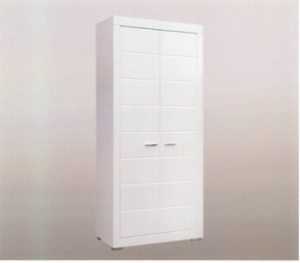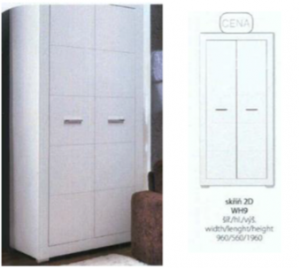Litigation Background
Fabryki Mebli “Forte” S.A., the applicant, on 17 September 2013, applied to the EUIPO for the following Community design, which was granted on 21 November 2013.

On 14 March 2016, the intervener Bog-Fran sp. z o.o. sp.k, filed an application for a declaration of invalidity of the applicant’s design on the grounds that it was not new and lacked individual character. In support of its application, it submitted the following representation of a piece of furniture called ‘skrin 2D WH9’ to which the earlier design had been applied.

After passing through the Invalidity Division of EUIPO and the Third Board of Appeal of EUIPO, the case was referred to the Board of Appeal of the CJEU, which, by decision of 28 October 2020 (hereinafter, the contested decision), dismissed the case. On this ground, the applicant Fabryki Mebli “Forte” S.A. finally appealed to the EGC, claiming that the Board of Appeal had wrongly considered that the earlier design had been disclosed and, moreover, that the earlier design lacked individual character.
Decision of the Court
Disclosure of previous design
First, the Court provided that in order to determine whether a prior design has been disclosed, a two-step analysis is necessary:
- Examine whether the evidence submitted in the application for a declaration of invalidity establishes facts constituting disclosure of a design and, that such disclosure predates the filing or priority date of the contested design.
- If the holder of the contested design has claimed otherwise, examine whether these facts could reasonably have been known in the normal course of business to circles specialised in the sector operating in the European Union, failing which a disclosure will be deemed to have no effect and will be disregarded (judgment of 13 June 2019, Visi/one v EUIPO – Easyfix (Display holder for vehicles), T 74/18, EU:T:2019:417, paragraph 24).
It also argued that it is for the party challenging the disclosure to demonstrate to the requisite legal standard that the circumstances of the case could reasonably have prevented those facts from becoming known to the circles specialised in the sector concerned in the normal course of business (Joined Cases T 22/13 and T 23/13 Umbrellas, EU:T:2015:310, paragraph 26).
In that regard, with regard to the examination of whether or not it was actually possible for the circles specialised in the sector to have knowledge of the facts constituting disclosure, having regard to what may reasonably be required of those circles as regards knowledge of the state of the art, the Court held that:
- A drawing cannot be considered to be known in the ordinary course of business if the circles in question can only become aware of it by chance.
- It may reasonably be known in the ordinary course of business if images of that design were distributed to traders operating in that sector.
- Disclosure to the public depends only on the manner in which that disclosure is actually made and not on the product in which that design is intended to be incorporated.
For these reasons, the Court, finding that the applicant had not adduced any factual evidence to show that the circumstances of the case could reasonably prevent the disclosure from becoming known, found that such evidence did not establish the existence of an obstacle to knowledge.
Consequently, the Board dismissed this complaint, concluding that the earlier design had been disclosed within the meaning of Article 7(1) of Regulation No 6/2002.
Individual character of the design at issue
In line with what the Board of Appeal had already stated, the Court held that the designs at issue were identical in their rectangular shape and white colour.
It also referred to the fact that “small differences, where they are not sufficiently pronounced to distinguish the goods in question in the perception of the informed user, are negligible in the overall impression” (see judgment of 21 April 2021, Bibita Group v EUIPO – Benkomers (Beverage bottle), T 326/20, EU:T:2021:208, paragraph 63 and the case-law cited). Slight differences cannot therefore have a decisive influence on the overall impression produced by that design.
In the light of the above, the Court reconfirmed the decision of the Board of Appeal concluding that the contested design lacked individual character.
For those reasons, the Court finally dismissed the appeal and ordered Fabryki Mebli ‘Forte’ S.A. to bear its own costs and to pay those incurred by the European Union Intellectual Property Office (EUIPO) and by Bog-Fran sp. z o.o. sp.k.
ECLI:EU:T:2022:108 of 2 March 2022, Case T-1/21.


 Español
Español Deutsch
Deutsch